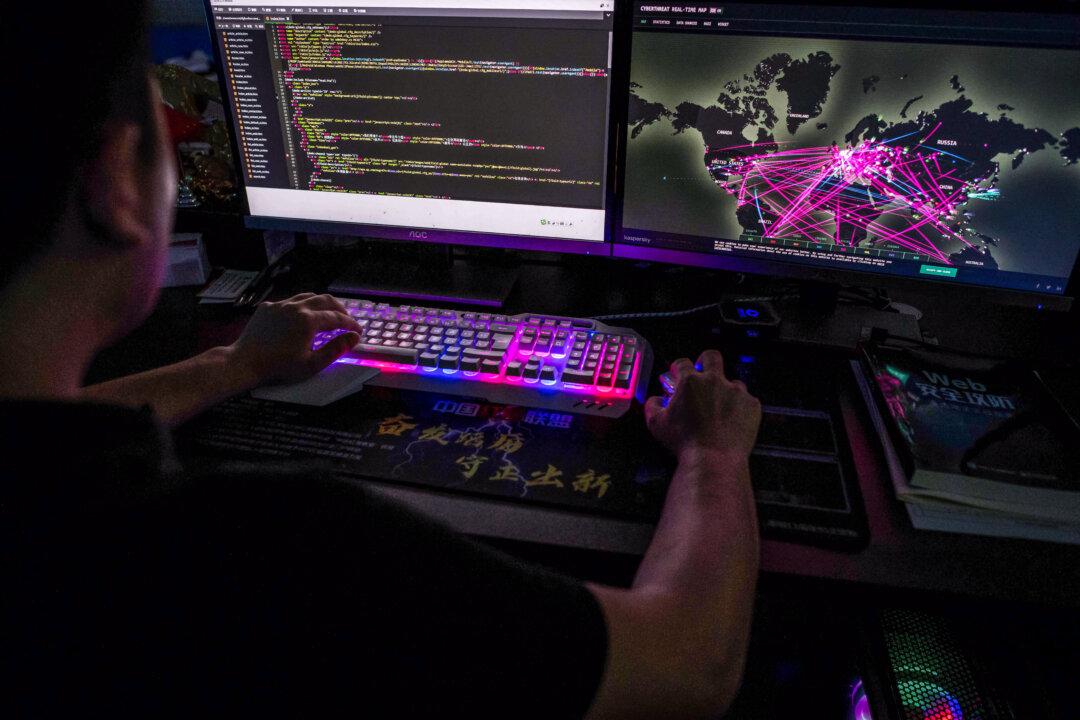Commentary
China’s latest hack of Americans, which gives Beijing access to all of our phone calls and texts in real time, should be the last straw. It won’t be. But it should be.
Agents of the Chinese Communist Party (CCP) can now listen in to pretty near any American citizen using Verizon, AT&T, and other networks. The hack—part of one of the many recent cyber espionage “typhoons”—targeted the phone calls of former President Donald Trump, vice presidential candidate JD Vance, and leading campaigners for Vice President Kamala Harris, among others. According to sources cited in The Washington Post on Nov. 2, these people have been hacked for months already.
The Chinese Ministry of State Security has apparently cracked into our phones the same way the FBI would—through built-in backdoors for the latter’s use. Beijing not only uses our law enforcement systems to target our top politicians but also hacks our top business leaders as well. Think about how the CCP can capitalize on the wealth of confidential business data flowing through a CEO’s phone every day. It should be no wonder that the U.S. economy has weakened for decades relative to China, whose companies likely get some of this data from the CCP when it helps their bottom line. We don’t and won’t do that to Chinese companies to advantage American companies because it is against our business ethics.
So there are a few other options to counter China, such as increased tariffs, economic sanctions, and export controls that move us closer to decoupling. These measures should not be lightweight. Hacking the phone of a future president or vice president should be game over for diplomatic and commercial relations with a country. We should demand that our partners and allies take similar measures. We don’t want our toughness on Beijing to result in Europe or Japan being compromised by sweetened offers from the CCP.
We should ask that our companies operating in China start disentangling themselves by selling assets that cannot be profitably removed to another location. U.S. businesses need to start doing this before those assets become unsellable or are nationalized by the state. Moscow seized some U.S. assets in Russia over the past years, and Beijing could do the same in China.
When things get this bad, these dictatorships are not going to allow our companies and those of our allies—like VW, Tesla, and Nike—to just sell their local subsidiaries, repatriate their profits, and move out after a friendly going-away party. So what can be sold now should be sold now. The status quo cannot hold when that status quo is us sliding into geopolitical irrelevance because we fail to take stronger action sooner in self-defense.
In addition to all the aforementioned forms of economic retaliation, there should be much tougher diplomatic retaliation against China.
That could mean the expulsion of CCP officials, including China’s ambassadors, consul generals, and their representatives to the United Nations. That is how bad it has gotten.
China would, of course, retaliate by ejecting U.S. diplomats from China. Embassies on both sides would close. Where would that leave U.S. businesses that were slow to leave China? Out on a limb. So they should take those actions now to decouple before it is too late.
Every day, Beijing does something new against us and our allies. How long can Washington ignore the threat to save American business there? Not much longer.
The presidential hack is just the latest offense to hit the news. Meanwhile, the CCP is accelerating its bullying of Taiwan with near-constant military “exercises” around the island democracy that appear to be practice for a naval blockade.
On Nov. 1, the People’s Liberation Army Navy conducted dual aircraft carrier operations in the South China Sea, which threatens all of our allies and partners there, including the Philippines, with whom we have a defense treaty.
Beijing has not significantly pressured North Korea against sending troops to help Russia’s attack on Ukraine. China is pushing its global influence, including by opening its borders to visa-free travel by many U.S. allies and allowing for increased foreign investment in its companies.
That will paper over the CCP threat and influence U.S. and allied investors into doing nothing for longer and asking Washington to follow suit. While Beijing has not taken an obvious stand on the presidential race, it has attempted to influence other races by deploying misinformation against those candidates critical of the CCP.
Beijing compromised American water, transport, and energy networks to incapacitate them in case of military escalation. Any of these acts of aggression should have been enough for us to take much stronger measures against China than we have. None of them resulted in what has become necessary to defend the United States.
There’s a silver lining to this storm cloud: At least we finally sold Taiwan some powerful medium-range surface-to-air missiles in the latest $2 billion arms sale to that country.
But this is not much good news in the deluge coming from Beijing. Every new storm makes us slide down the slope of irrelevance that much faster.





